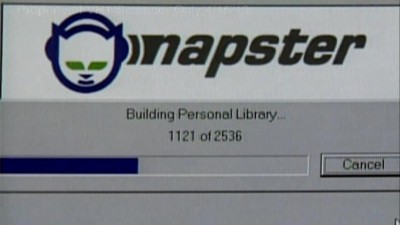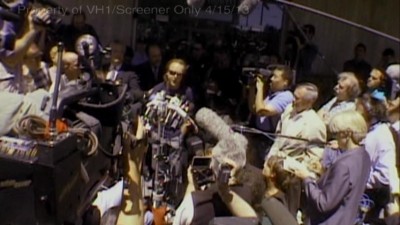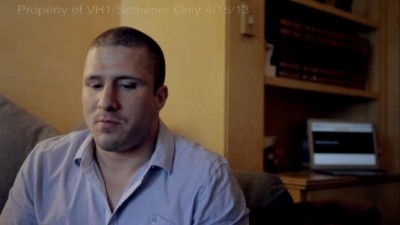| Reviews & Columns |
|
Reviews DVD TV on DVD Blu-ray 4K UHD International DVDs In Theaters Reviews by Studio Video Games Features Collector Series DVDs Easter Egg Database Interviews DVD Talk Radio Feature Articles Columns Anime Talk DVD Savant Horror DVDs The M.O.D. Squad Art House HD Talk Silent DVD
|
DVD Talk Forum |
|
|
| Resources |
|
DVD Price Search Customer Service #'s RCE Info Links |
|
Columns
|
|
|
Downloaded
In Downloaded, Alex Winter (whom you may know best as Bill S. Preston in the Bill and Ted movies) has put together an account of the rise and fall of Napster, the infamous music file-sharing program that began in college student Shawn Fanning's dorm room and grew into its own company before being sued by the Recording Industry Association of America (RIAA).

Done in a rather fast-paced fashion with no narration, Downloaded gives a good account of how Napster changed the music industry. A very large number of artists and industry folk appear here, but the most prominent are Chris Blackwell (founder of Island Records), Henry Rollins, Noel Gallagher, Seymour Stein (founder of Sire Records, one of my favorite labels in the 1980s). Plenty of insight from Shawn Fanning himself and Napster's co-founder Sean Parker, as well as Napster's Senior Director of Technology Ali Aydar is also included.
Shawn Fanning talks about how he felt more connected to people he talked to online than those he knew in real life, and then when he first discovered downloadable MP3 music files. After hearing a downloaded MP3 for the first time, he thought "there's such a crazy amount of emotion (in music), and that you could share that emotion over the internet- it was really wild to think that something so important to you, you could just trade so freely." He then thought of the possibilities of being able to easily discover new music by listening to songs your friends liked. The ways of finding and downloading MP3s back then were rather cumbersome, so Fanning began work on a program that would make this much easier. It ended up being an obsession until he finally quit school in order to devote all his time to it, and brought on a number of people to help work all the bugs out (though he wouldn't let them see the source code, which in a way made it more fun for some of them.)
Eventually it was up and running, and it became extremely popular mostly just through word of mouth. Those behind the major record companies however didn't notice it until it was too late- when Napster had already started cutting into legitimate music sales, it was demonstrated at an RIAA meeting, where most there were seeing it for the first time, and most of them were shocked at how easy it was for users to access recordings without paying for them. Legal action was finally taken which ultimately put an end to Napster but as we all know the music business hasn't been the same since. Downloaded shows footage of these legal proceedings as well as more recent reflections on them from those who were there. One sequence shows members of the band Metallica and their attorney delivering several boxes full of information on users who had illegally uploaded their music onto the internet, demanding that they be removed from the system. Comments are then given on how surprised many were of a heavy metal band, whose music generally symbolized rebellion, would be among the first artists to be upset about Napster. Footage shot outside Napster's office during Metallica's visit has one music fan say he would have expected someone like Celine Dion to take legal action before Metallica, but jokes that Napster users didn't have any of her music anyways. In addition to the big legal proceedings against Napster, incidents where record labels sued private citizens who downloaded music are also mentioned.

Being a few years older than most of the people behind Napster, I wasn't very up to speed on it during its heyday. I was still using dial-up internet and mainly visiting more familiar websites (like DVDTalk) and newsgroups, using rather primitive equipment. When I finally got a computer that could even run the Napster program (in late 2000), I downloaded exactly one song using it: Peter Godwin's "Baby's in the Mountains", a song I hadn't heard since 1983 and could never find on anything currently in print. I remember it taking quite a while to download, and could then only hear it on my small computer speakers (I didn't even have any way of burning CDs at the time). That computer has since been replaced and I couldn't tell you what happened to that music file, although I have since found and bought two compilation CDs that included that song. Although there is one comment in this documentary from someone who recalls when they began collecting music on their computer and exclaimed "This is how I'm going to listen to music from now on!", I could never see the attraction of listening to music on computer speakers rather than a large sound system. Besides that, music obtained online was compressed while CDs gave you the full recording (arguments about vinyl possibly being better notwithstanding).
Of course the main appeal of Napster was being able to get music for free. The closest to this beforehand was borrowing someone else's album and making a cassette of it, which I was guilty of doing long ago, but there was significant awareness among most people that doing this was morally wrong as the artists and record companies did not make any money from doing this. Many of the young people using Napster didn't seem to get this- Downloaded shows an MTV News reporter (circa late 1990s) interviewing a college student who says he doesn't see downloading music as stealing.
I had been buying CDs rather early (starting in 1985), and by the time I was in college I was known as "that guy with a ton of CDs." They were practically the only thing I spent my money on, and I'd buy almost anything at the right price. By the late 90s however my buying slowed down severely, partly because I was losing interest in a lot of music of that time but also because record labels had been raising their prices. New albums were list-priced at around $17, when back in 1985 I had heard speculation from record companies that CD prices would be LOWERED as they became cheaper to manufacture. I simply refused to pay the higher prices and spent more time re-listening to CDs I had already purchased, and apparently many other music fans turned to Napster. A short clip near the beginning of Downloaded is one of the only mentions of the price issue that I thought explained it very nicely, where someone says "I'd like to just buy it, but I can't spend $16 on a CD." When I had heard of Metallica's visit to the Napster offices, I remember wanting to ask them why they didn't also go to their record label's offices and demand an explanation as to why they had raised the prices of many of their older albums?

In the end, Downloaded is a good account of how the music industry was caught off-guard, though again I don't blame the phenomenon of illegal downloading entirely for declining music sales and the closing of many record stores over the past decade. The story essentially tells itself through clips dating from the late 1990s up through now, with Alex Winter seeming to keep his own thoughts out of it. DJ Spooky provides an electronic score that works nicely with the material, its tempo varying according to how much fun Fanning and friends are having versus their being in legal trouble. One important detail that the documentary didn't show was any examples of music Shawn Fanning, or any of the others behind Napster, liked. I imagine many major labels would not want to license music for a movie on this subject, but it would have been interesting to at least know what some of their favorite songs were.
The DVD I received for this review was a burned "screener" disc- a retail release for Downloaded has not yet been announced.
Jesse Skeen is a life-long obsessive media collector (with an unhealthy preoccupation with obsolete and failed formats) and former theater film projectionist. He enjoys watching movies and strives for presenting them perfectly, but lacks the talent to make his own.
|
| Popular Reviews |
| Sponsored Links |
|
|
| Sponsored Links |
|
|
| Release List | Reviews | Shop | Newsletter | Forum | DVD Giveaways | Blu-Ray | Advertise |
|
Copyright 2024 DVDTalk.com All Rights Reserved. Legal Info, Privacy Policy, Terms of Use,
Manage Preferences,
Your Privacy Choices | |||||||












